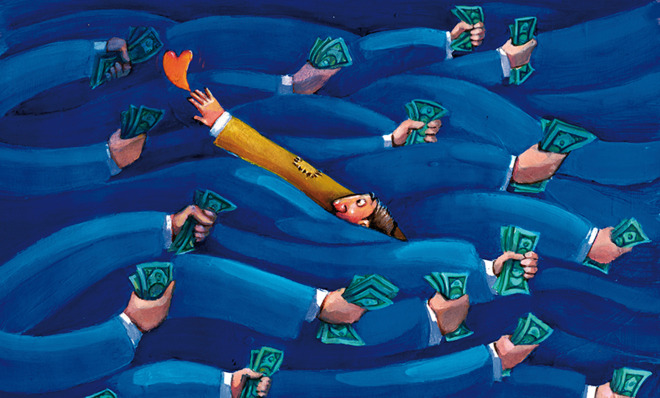The case for revisiting ethics in the dismal science
Just making profit isn't enough

A free daily email with the biggest news stories of the day – and the best features from TheWeek.com
You are now subscribed
Your newsletter sign-up was successful
The ethical business gets a bad rap in economics. While in the real world, people flock to Tom's Shoes for its social mission, in economics, the company's ethics are found in its profit margin.
I blame Milton Friedman's "The Social Responsibility of Business is to Increase its Profits." Though more nuanced than the title suggests, Friedman's article is what got "greed is good" started. In his conclusion, Friedman says that a business' only social responsibility is "to use its resources and engage in activities designed to increase its profits." It's a compellingly simple idea, but it rests on one fatal assumption: that economics can understand wellbeing.
Economics is often taught as a set of perfectly neutral tools for designing the right policy. It begins with the simple notion that for two people to agree to trade, each must believe that they are made better off by it. From this and similarly simple assumptions, the following theoretical edifice is built up: Under the right circumstances, the pursuit of profit makes everyone better off.
The Week
Escape your echo chamber. Get the facts behind the news, plus analysis from multiple perspectives.

Sign up for The Week's Free Newsletters
From our morning news briefing to a weekly Good News Newsletter, get the best of The Week delivered directly to your inbox.
From our morning news briefing to a weekly Good News Newsletter, get the best of The Week delivered directly to your inbox.
"Under the right circumstances" becomes Friedman's primary qualification to his thesis. In his view, maximizing the profit of the firm is good so long as it stays "within the rules of the game," meaning, for example, "without deception or fraud." Policymakers should focus on developing laws that delineate the nature of things like "fraud," the thinking goes, while business people should simply focus on creating profit within the rules. No need for ethics of any kind.
The problem is, economics does not provide us with neutral criteria. Yes, people believe they are making themselves better off when engaging in trade, but it is not neutral to say that they are mostly right. Economists have a definition for "better off;" it's basically a highly formalized model of what human preferences look like and how they are satisfied. But even if we buy into the model — and the behavioral and experimental economics literature gives us plenty of reason to be skeptical — giving someone what they want isn't really the same thing as making someone better off.
A better argument, from an ethical point of view, comes from embracing our liberal, Enlightenment heritage. This is the argument that every individual, no matter their social status, gender, race, religion, or occupation, deserves dignity and our respect. They deserve to be treated like adults who are capable of making decisions on their own behalf about what is good for them. This argument does not exist in a vacuum, but it forms the core assumption of our modern liberal order.
From this point of view, what business people ought to do is work their hardest to provide something they honestly judge to be of value to their customers. Notice that doesn't mean giving away a pair of shoes to needy children in Africa. Most of the time, it means simply attempting to give people a product that they want. Sometimes, it means providing something that they believe is valuable and attempting to persuade potential customers. Profit is a valuable source of information for both of these strategies, but not an end unto itself.
A free daily email with the biggest news stories of the day – and the best features from TheWeek.com
The key to such a model is trust. Economists are well aware that trust is a crucial component of trade, but often neglect the importance of having people who are trustworthy as a prerequisite for building trust. If people were maximally opportunistic the way that the standard economic model implies, the costs of monitoring every employee to keep them from stealing company equipment or slacking off would be prohibitive. There is also a whole host of things we like to trust that people in business will not do, such as knowingly putting customers at risk. We want businesses run by people who are trustworthy to their customers as well as to their shareholders.
We already have an enormous body of stories, poems, philosophies, and tacit knowledge concerning what it means to be honorable and trustworthy. From this point of view, telling people to maintain Pareto improvements is a far less effective guideline than asking "Would your grandma be proud of you?" Economics should take note.
Adam Gurri works in digital advertising and has an MA in economics from George Mason University. He writes on subjects ranging from philosophy, ethics, and rhetoric to technology, social science, and innovation. His present research focuses on the ethics of business and work, from the perspective of virtue and human flourishing.
-
 The environmental cost of GLP-1s
The environmental cost of GLP-1sThe explainer Producing the drugs is a dirty process
-
 Greenland’s capital becomes ground zero for the country’s diplomatic straits
Greenland’s capital becomes ground zero for the country’s diplomatic straitsIN THE SPOTLIGHT A flurry of new consular activity in Nuuk shows how important Greenland has become to Europeans’ anxiety about American imperialism
-
 ‘This is something that happens all too often’
‘This is something that happens all too often’Instant Opinion Opinion, comment and editorials of the day